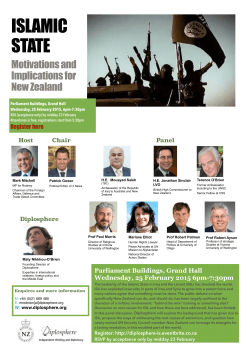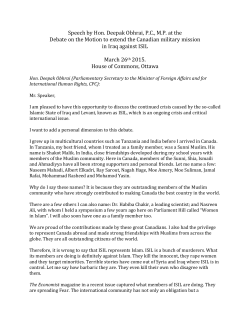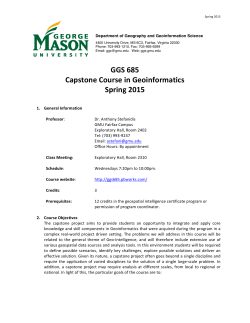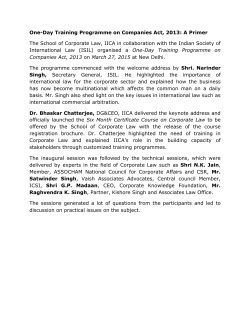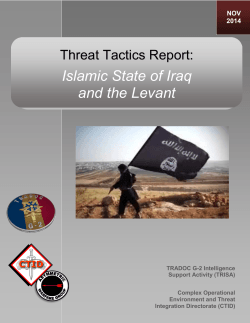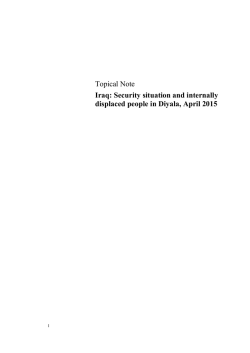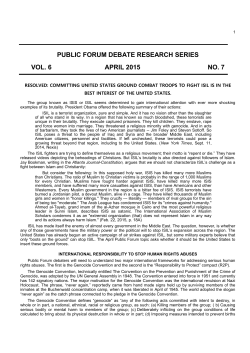
testified - Just Security
Statement by Bill French Policy Analyst, National Security Network Congressional Progressive Caucus Forum on ISIL and the President’s AUMF Proposal March 16, 2015 Distinguished members of Congress, I am honored to join you to discuss the president’s proposed authorization for use of military force (AUMF) against ISIL. Over the next few minutes, I would like to outline how a number of key national security issues relate to considering the president’s proposed resolution and what kind of provisions it should – and should not – ultimately include as a result. In particular, I will focus on select aspects of how the U.S. military strategy against ISIL should inform congressional action on a potential AUMF. As I think all of us know, ISIL poses a very real national security threat to the United States. The organization threatens U.S. and partner interests in the region, including: (1) the territoriality of states in the Middle East; (2) human security on a mass scale; (3) and the political stability of American partner-states, especially Iraq. It is precisely the significance of these national security concerns that mean it is important that Congress play its role in helping to institute an effective counter-ISIL strategy that uses all elements of American national power, including diplomatic, economic, informational, and military. To that end, a well-crafted and tailored AUMF can serve as a powerful tool for making sure any war authority is tied to an effective and appropriate strategy. The administration’s proposal is a step in that direction, but there are a number of key issues remaining regarding the relationship between the military outlook of the campaign and the content of the president’s proposed AUMF. First, the proposal does not define the objectives of the war against ISIL. Without specifying objectives – and other important limitations some of my colleagues will discuss in more detail – the next president would be free to perhaps dramatically change the nature of the campaign before consulting with Congress. Moreover, giving objectives in statute can help focus the kind of collective understanding of the conflict that is conducive for full debate over the justification for the authorization, including future reassessments. But this is not to say we don’t know what the objectives of the campaign are. Officials have elsewhere defined the purpose of the conflict in terms of “degrading and ultimately destroying” ISIL. But “destroying” ISIL poses significant military and political challenges to which there does not yet appear to be any realistic solutions proposed by either the administration or outside policy community. Militarily, full destruction of the organization appears unrealistic given that the United States and coalition forces have not yet destroyed organizations like core al-Qaeda and the Taliban despite more than a decade of war involving sizable ground forces. While the United States is set to increase its assistance to moderate members of the Syrian opposition, their top priority is fighting the Assad regime, not ISIL. Politically, destroying ISIL requires being able to extend legitimate political governance over the territory taken back from the organization. This can be accomplished in Iraq, where a central government exists, but it’s not clear what the path forward would be in Syria, unless the Syrian civil war is first resolved. At present, no political entity exists in Syria that has the capability or intent to govern the territory and population presently controlled by ISIL – nor are there any credible plans that I’m aware of to create such an entity. Second, the proposal omits a number of key reporting requirements that could be important for reassessing the conflict, its strategy, and its progress. In particular, there is a need for regular reporting on things like: (1) What is the whole-of-government strategy in detail? (2) What are the metrics of success in the campaign? (2) How are these metrics being met or not? (3) What capabilities and intent does ISIL have to target the American homeland, if any? Authoritative reporting on these issues would facilitate continued congressional assessment of the strategy and whether it is either necessary or wise to reauthorize the conflict, assuming a sunset provision remains a part of the AUMF as under the president’s proposal. Third, any final AUMF will be a product of the political process. Therefore, it is important to prevent provisions that would be potentially harmful to national security from being added. There are many counterproductive provisions that could be added, but one stands out above all others: some conservative members of Congress have called for making sure this AUMF gives the president the authority to attack the Assad regime, which constitutes the main opponent of the moderate Syrian opposition. They argue this is necessary to protect the moderate opposition who we are assisting. But granting this and future presidents any statutory authority to launch strikes against the Assad regime would open the door to mission creep on the Syrian side of the war that could expand to U.S. forces being ordered to degrade the Syrian military and, ultimately, perhaps topple the Assad regime itself. These kinds of operations would be a sizable military undertaking and differ significantly in character from the kind of operations conducted during the campaign thus far. Taking on Assad would also risk the United States inheriting Syria’s full political future, potentially including nation-building activities. This would be a dramatically different war than the one heretofore debated by Congress. It is worth mentioning that the possibility of military escalation against Assad as an extension of the war against ISIL is not merely a position advocated by conservative hawks. American officials have made clear that they agree protecting U.S.-trained forces in Syria against the Assad regime will be important to battlefield success and that they are deliberating on how to best provide such protection. While U.S. officials have also said any such operations would not be conducted under ISIL AUMF authority, they did not specify what other authority would be used. With that, I thank you for your time and look forward to your questions.
© Copyright 2025
